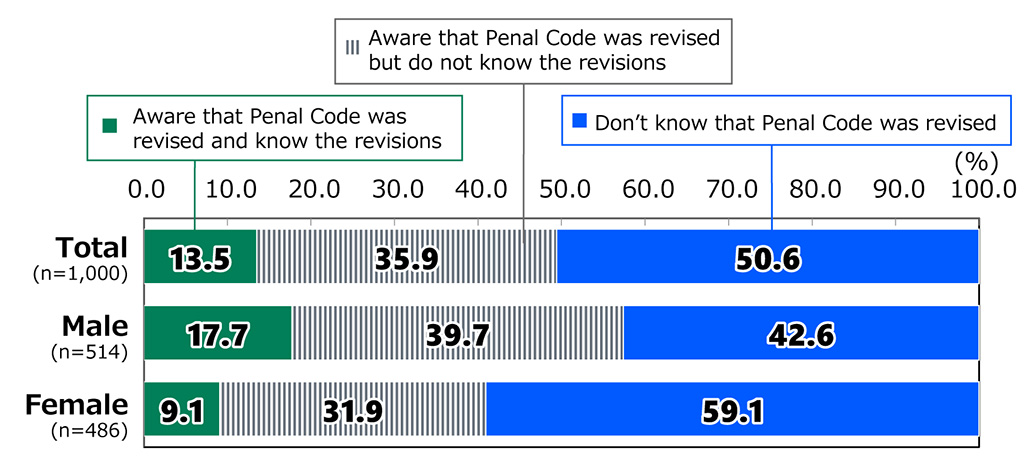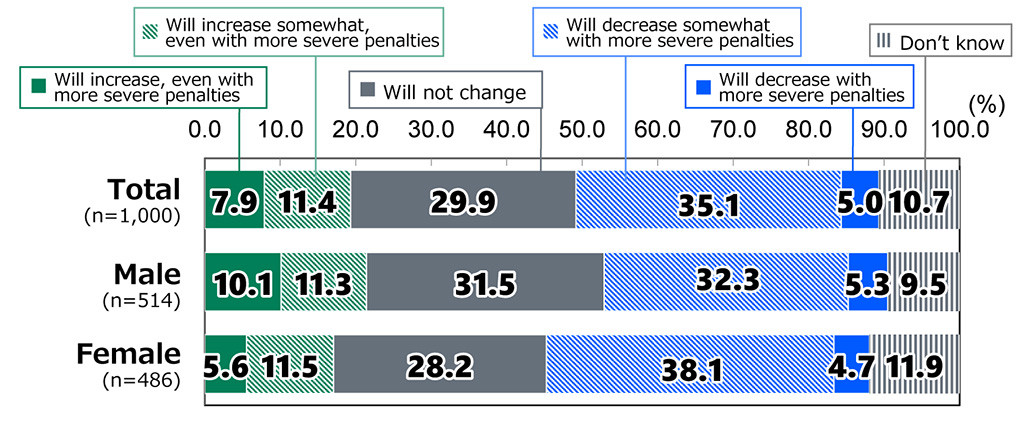Awareness Survey of 18-Year-Olds – Internet Use and Online AbuseResults of 50th installment announced
The 50th installment of the Awareness Survey of 18-Year-Olds, launched by The Nippon Foundation in October 2018, was carried out from September 22 to 27 on the subject of “Internet Use and Online Abuse.” The survey of 1,000 respondents in Japan aged 17 to 19 was intended to examine young people’s thinking regarding strengthening laws on online abuse and slander.
Although more than half were not aware that that the Penal Code had been revised to impose more severe penalties for online abuse, roughly 80% supported the move. Roughly half questioned the new law’s effectiveness, however, stating that even with more severe penalties, online abuse would increase or remain unchanged.
With regard to the Tokyo High Court’s recent ruling awarding damages for indirectly posting defamatory comments on social media using features like “retweet” or “like,” only roughly 20% replied that compensation for damages is required. In particular, roughly 40% felt that penalties are unnecessary for using the “like” feature, suggesting that this feature gives less sense of being a legal violation than “retweet.” At the same time, roughly 40% felt that compensatory damages were necessary when classmates posted a photograph with defamatory comments about someone’s outward appearance, and roughly 20% replied that criminal penalty penalties were needed.
Highlights of the 50th Awareness Survey of 18-Year-Olds – Internet Use and Online abuse
Awareness of revisions to Penal Code
- “Did not know” – 50.6%
View of stronger penalties for online abuse
- Support (“Support” + “Somewhat support”) – 80.2%
- Oppose (“Oppose” + “Somewhat oppose”) – 3.2%
Effect of more severe penalties on number of defamatory posts
- Will increase or remain unchanged – 49.2%
- * Total of “Will increase, even with more severe penalties,” “Will increase somewhat, even with more severe penalties,” and “Will not change.”
Have personally made defamatory posts
- Have posted – 18.7%
- Have shared / retweeted – 14.3%
- * Total of “Have, and specifically remember the details” and “Have, but do not specifically remember details”
Penalties for online speech and actions
- Liking another person’s defamatory post
- No penalty needed – 37.9%
- Civil compensation for damages, etc. – 20.5%
- Criminal penalty, etc. – 13.1%
- Retweeting another person’s defamatory post
- No penalty needed – 29.6%
- Civil compensation for damages, etc. – 23.8%
- Criminal penalty, etc. – 13.3%
- Posting a celebrity’s photo and calling them “ugly”
- No penalty needed – 15.3%
- Civil compensation for damages, etc. – 34.2%
- Criminal penalty, etc. – 21.2%
- Posting a classmate’s photo and calling them “ugly”
- No penalty needed – 12.9%
- Civil compensation for damages, etc. – 38.7%
- Criminal penalty, etc. – 22.6%
Survey Excerpts



Notes:
- From the 13th survey, the number of respondents, comprising men and women aged 17 to 19, has been increased to 1,000 from 800.
- With the exception of the 20th and 46th installments, “Awareness Survey of Society and Country,” all surveys cover respondents in Japan only.
Contact
Public Relations Team
The Nippon Foundation
- Email: cc@ps.nippon-foundation.or.jp



